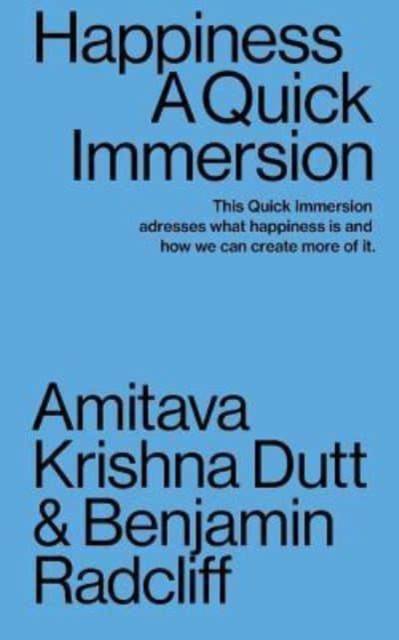
- Retrait gratuit dans votre magasin Club
- 7.000.000 titres dans notre catalogue
- Payer en toute sécurité
- Toujours un magasin près de chez vous
- Retrait gratuit dans votre magasin Club
- 7.000.0000 titres dans notre catalogue
- Payer en toute sécurité
- Toujours un magasin près de chez vous
Description
"In this valuable study, an economist and political scientist combine to produce a succinct survey and synthesis of the multidisciplinary literature on happiness and assess its implications for how to improve personal and societal well-being." - Richard Easterlin, University Professor Emeritus USC and creator of the Easterlin paradox
"This concise and bracing little book does exactly what it says. It plunges readers into the recent science, economics, and politics of happiness, and will leave them feeling clarified and refreshed." - Darrin M. McMahon, Professor of History at Dartmouth College
"This essential book moves beyond the 'happy talk' that marks the tidal wave of self-help books on happiness. Instead Radcliff and Dutt provide an accessible, engaging, and thoroughly multidisciplinary roadmap to the vast scholarly literature on the field of 'happiness science.' There is every reason to expect that the book will be a key reference for scholars and students entering this burgeoning area of research." - George DeMartino, professor of international economics at the University of Denver
This book provides a short immersion to the subject of happiness by examining the scholarly literature on it. Among the questions it explores are: What is the meaning of happiness? Is it something that it is possible to understand in general terms, perhaps by distinguishing between different meanings of it, or is it something that is best left to people to define for themselves as they seek to be happy in their own way? Can happiness and its different meanings be measured and, if so, how? On what does happiness depend? Does a person's happiness depend on his or her disposition and individual circumstances, or does it depend in part on how society is organized and on what the government does? Does money buy happiness? What kinds of political, economic, social and environmental factors make people and societies happier? What can people do, either individually or collectively, to become happier?
"This concise and bracing little book does exactly what it says. It plunges readers into the recent science, economics, and politics of happiness, and will leave them feeling clarified and refreshed." - Darrin M. McMahon, Professor of History at Dartmouth College
"This essential book moves beyond the 'happy talk' that marks the tidal wave of self-help books on happiness. Instead Radcliff and Dutt provide an accessible, engaging, and thoroughly multidisciplinary roadmap to the vast scholarly literature on the field of 'happiness science.' There is every reason to expect that the book will be a key reference for scholars and students entering this burgeoning area of research." - George DeMartino, professor of international economics at the University of Denver
This book provides a short immersion to the subject of happiness by examining the scholarly literature on it. Among the questions it explores are: What is the meaning of happiness? Is it something that it is possible to understand in general terms, perhaps by distinguishing between different meanings of it, or is it something that is best left to people to define for themselves as they seek to be happy in their own way? Can happiness and its different meanings be measured and, if so, how? On what does happiness depend? Does a person's happiness depend on his or her disposition and individual circumstances, or does it depend in part on how society is organized and on what the government does? Does money buy happiness? What kinds of political, economic, social and environmental factors make people and societies happier? What can people do, either individually or collectively, to become happier?
Spécifications
Parties prenantes
- Auteur(s) :
- Editeur:
Contenu
- Nombre de pages :
- 206
- Langue:
- Anglais
- Collection :
- Tome:
- n° 3
Caractéristiques
- EAN:
- 9781949845044
- Date de parution :
- 23-04-19
- Format:
- Livre broché
- Format numérique:
- Trade paperback (VS)
- Dimensions :
- 127 mm x 203 mm
- Poids :
- 208 g

Les avis
Nous publions uniquement les avis qui respectent les conditions requises. Consultez nos conditions pour les avis.






